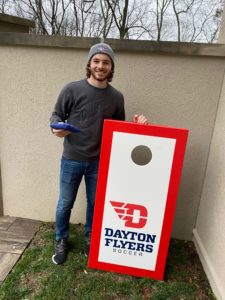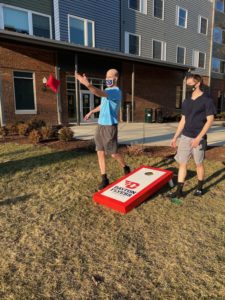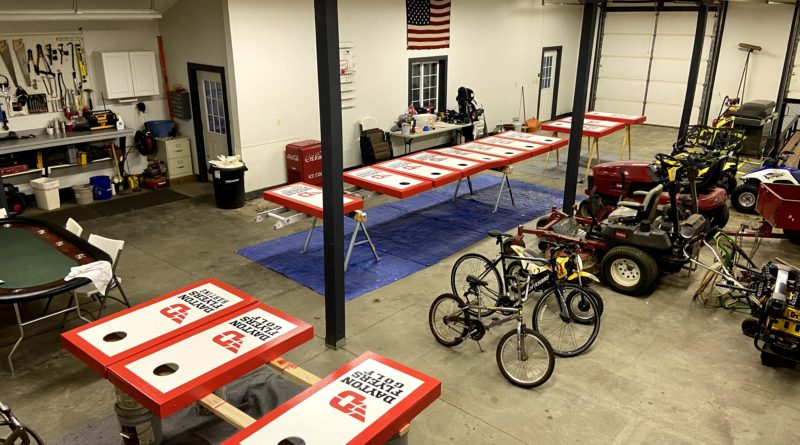Spotlight on UD’s Entrepreneurship Program
UD students have gotten creative during the pandemic in the Entrepreneurship Program.
Grace Dipierro
News Staff Writer
The University of Dayton’s Entrepreneurship Program has been ranked among the nation’s best by The Princeton Review and Entrepreneur Magazine for the last 15 years, and this year is no exception.
Vince Lewis, director of the L. William Crotty Center for Entrepreneurial Leadership, has a slew of responsibilities related to entrepreneurship, one of them being that he works with UD students in the entrepreneurship program. The program gives UD students the opportunity to start their own microbusinesses on campus.
As a result of COVID-19, Lewis and his colleagues had to think about ways to modify the Entrepreneurship Program. Lewis worked with Karlos Marshall, Crotty Center employee and manager of the Greater West Dayton Incubator, as well as Castel Sweet, director of Community Engagement and Diversity, Equity and Inclusion (D,E&I) in the Crotty Center.
Together, Lewis said they came up with a plan to restructure the microcompany class to “create a meaningful experience out of what the students are going through.”
To do this, the class was structured so that all of the projects had to leverage digital marketing tools such as social media. Essentially, students had to use whatever social media they were comfortable with and create an online store or some kind of ecommerce website.
“It is a real shift because the microcompany class has always been a kind of retail selling class with face to face connection, selling, knocking on doors,” Lewis said. “So this has been a much different experience.”
There are currently eight micro-businesses running with around 40 students total. According to Lewis, the success of these companies varies. Some are not selling very much while others are close to a couple thousand dollars in sales. Either way, Lewis said that this is a “meaningful experience because these are tools that you are going to need as a business owner when you graduate.”
Lewis also noted that being able to adapt is one of the most important lessons to learn about entrepreneurship. One team is selling masks to use during the pandemic, showing that UD students can capitalize on our current environment by selling PPE. Another group has partnered with beloved food truck DD’s to sell DD’s apparel.
“Entrepreneurship is all about ambiguity,” Lewis said. “Dealing with the unknown, and trying to move forward.”
One sophomore entrepreneurship major, Dominic Ruffolo, created a company that sells custom cornhole boards. Ruffolo is the founder of Flyer Gaming and has learned a lot from his sister, Dani Ruffolo, founder of Handy Hats. Flyer Gaming customizes the boards with any logo, team name, sport or UD house address.

While Ruffolo is in charge of most of the company’s activities, he also has help from two classmates, Alexis Goins and Nicole Albeza. Goins and Albeza assist with marketing, sales and networking.
“We got the process figured out early so we didn’t have to worry about it and now we are just trying to sell for the last few weeks of the class,” Ruffolo added.
The whole process of making the cornhole boards takes about 2-4 weeks. Ruffolo and his team have to gather wood, cut and measure it, assemble the boards and then decorate and paint them before shipping.
“I didn’t know anything about woodworking before this and now I know a little bit,” Ruffolo said.
Additionally, Ruffolo said he has gotten a lot of experience with networking, creating flyers, following a business plan and managing time. Since Ruffolo is on the soccer team and taking a full schedule of classes, he has had to improve his time-managing skills.
Ruffolo’s cornhole business has worked well given the COVID-19 environment. He noted that cornhole is “good for right now because we have to be physically distant but you can still have fun and do something.”

Ruffolo reflected on his time in the Entrepreneurship Program and said that it is “a really cool experience that you don’t really get in any other classes.” Ruffolo has plans to continue with his business once the program ends.
Looking forward, Lewis said that part of the microbusiness class will not just be taking advantage of the retail component of selling outside Kennedy Union. Instead, the part of the course that focuses on selling online and leveraging social media will remain for years to come.
For more campus news like Flyer News on Facebook and follow us on Twitter (@FlyerNews & @FlyerNewsSports) and Instagram (@flyernews)

